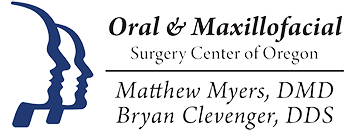Trust the
Surgeons With Compassion
Surgeons With Compassion
Wisdom Teeth Extraction
Third molars, commonly known as wisdom teeth, typically emerge as the final set of molars in the maturation process, completing their development in one’s late teens to early twenties. For residents in Medford, OR, seeking expert care in the management and removal of these teeth, the Oral and Maxillofacial Surgery Center of Oregon offers wisdom teeth extraction services. Patients receive attentive care from experienced specialists, ensuring comfort and optimal oral health outcomes.
Connect With Us


Impacted Wisdom Teeth
While the typical adult mouth is designed to house 32 permanent teeth, it’s common for individuals to have jaws that are too compact to fit the four wisdom teeth. When there isn’t enough room for these teeth to emerge, they become impacted. This term means that the teeth are unable to break through the gum line and align correctly for effective chewing and easy cleaning.
Types Of Impactions
- Soft Tissue Impaction: There is not enough room to allow the gum tissue to retract for adequate cleaning of the tooth.
- Partial Bony Impaction: There is enough space to allow the wisdom tooth to partially erupt. However, the tooth cannot function properly in the chewing process, which creates cleaning problems, among others.
- Complete Bony Impaction: There is no space for the tooth to erupt. It remains embedded in the jaw bone or, if even partially visible, requires complex surgical techniques for removal. The impacted wisdom tooth may also be in an unusual position and difficult to remove. This situation can also arise when the shape or size of the jaw bone and other facial structures make the removal of this tooth significantly more complex.
Why Should Someone Have Their Wisdom Teeth Removed?
Infection
Pericoronitis, a prevalent gum infection near wisdom teeth, often arises when there’s inadequate space for them to fully emerge. This can lead to irritation and infection in the surrounding gum tissue, causing persistent discomfort, swelling, and difficulties with chewing and swallowing.
Cyst Formation
Impacted wisdom teeth can lead to non-infectious conditions like cysts, fluid-filled “balloons” inside the jaw that destroy bone and teeth, and, although rare, tumors. These issues, particularly challenging if not addressed by teenage years, underscore the importance of early wisdom tooth removal.
Possible Crowding
Crowding, especially in lower front teeth, can occur after braces or in early adulthood, with impacted wisdom teeth potentially contributing. Oral surgeons remove them to avert future issues with teeth, gums, and jaw bones, even without immediate problems.
Damage to Adjacent Teeth
When there isn’t enough space to properly clean around a wisdom tooth, it can negatively impact the adjacent second molar, leading to gum disease, bone loss, and possibly tooth decay.
Extractions, Implants, & More
FAQs
What If I Don’t Have My Wisdom Teeth Removed As A Teenager Or Young Adult?
As wisdom teeth grow and the jaw hardens, removing them later in life leads to a more complicated and unpredictable recovery, increasing risks of infection and slow healing. It’s best to remove impacted wisdom teeth early—typically in your teens or twenties—for a safer, quicker recovery.
What Happens On The Day Wisdom Teeth Are Removed?
Patients often prefer sedation during wisdom tooth removal for a comfortable experience. Our licensed staff provides various anesthesia options in a safe, well-monitored environment. The procedure, lasting 30-60 minutes, requires fasting for at least 6 hours beforehand. Post-operative care includes managing pain and swelling with prescribed medication and, starting with a clear liquid diet, avoiding dairy immediately post-surgery to prevent nausea. We recommend a responsible adult accompany you for the day. Advanced techniques ensure minimal discomfort and rapid healing. Local anesthesia prolongs post-operative comfort, and any stitches used typically dissolve within a few days.
What Happens On The Day Wisdom Teeth Are Removed?
Patients often prefer sedation during wisdom tooth removal for a comfortable experience. Our licensed staff provides various anesthesia options in a safe, well-monitored environment. The procedure, lasting 30-60 minutes, requires fasting for at least 6 hours beforehand. Post-operative care includes managing pain and swelling with prescribed medication and, starting with a clear liquid diet, avoiding dairy immediately post-surgery to prevent nausea. We recommend a responsible adult accompany you for the day. Advanced techniques ensure minimal discomfort and rapid healing. Local anesthesia prolongs post-operative comfort, and any stitches used typically dissolve within a few days.
What Does Wisdom Tooth Removal Cost And Is It Covered By Insurance?
Treatment costs vary based on tooth extraction complexity and anesthesia choice. A consultation with an X-ray review and examination is needed for an accurate estimate. Insurance coverage differs — our office staff will assist in maximizing the benefits.
After Wisdom Teeth Removal Instructions
Types Of Impactions
- Immediately After Surgery:
- Keep gauze in place for 30 minutes, then discard.
- Avoid mouth rinsing or touching the wound to prevent bleeding.
- Begin pain medication when discomfort starts.
- Limit activities; resume normalcy when comfortable.
- Use ice packs to reduce swelling.
- Bleeding:
- Expected to some degree; control excessive bleeding by biting on gauze or a moist tea bag.
- Stay calm, upright, and avoid exercise.
- Swelling:
- Normal and proportionate to surgery.
- Use ice packs immediately for the first 36 hours, then moist heat to reduce swelling.
- Pain Management:
- Tylenol or Ibuprofen for moderate pain.
- Take prescribed medication for severe pain; avoid driving or machinery.
- Diet:
- Start with liquids; avoid straws.
- Eat soft foods and maintain high calorie and high protein intake.
- Stay hydrated; aim for 5-6 glasses of liquids daily.
- Oral Hygiene:
- No rinsing until the day after surgery.
- Gently brush teeth; salt water rinses after eating.
- Antibiotics and Other Medications:
- Take as directed; stop if adverse reactions occur.
- Nausea/Vomiting:
- Sip coke, tea, or ginger ale after an hour; then resume normal diet.
- Potential Complications:
- Numbness, slight fever, dizziness, mouth projections, dry/cracked lips, sore throat, and jaw stiffness should be normal but monitored.
- Follow specific instructions for activity, eating, and medication.
- Aftercare Specifics:
- Sutures help healing; removal is painless.
- Pain and swelling should decrease each day; contact the office if it worsens.
- Keep the tooth cavity clean; brush gently, and use salt water rinses.
- Be cautious with exercise; reduced nourishment intake may affect stamina.
Call us at 541-779-7799 to schedule an appointment and begin the process.

